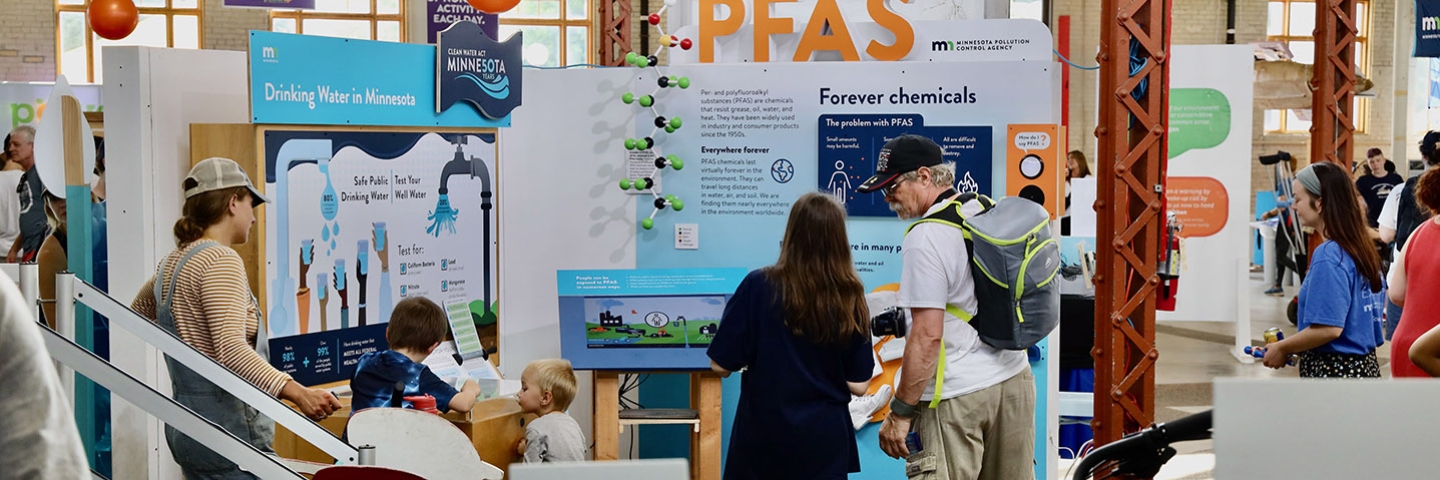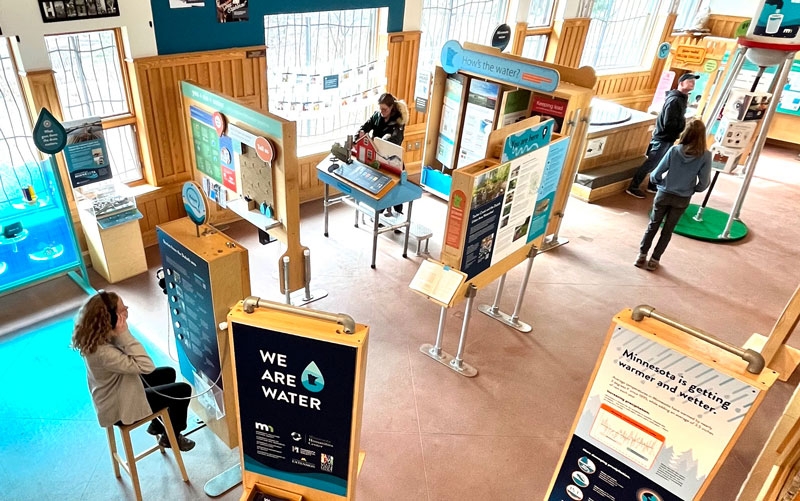Environmental education helps people of all ages explore environmental issues and discover how they can be a part of protecting Minnesota’s environment.
The MPCA provides information about the status of Minnesota’s air, water, land, and climate and can point you toward beneficial actions you can take as students, teachers, and life-long learners interested in Minnesota’s sustainable future.
Our programs
Events and exhibits
The MPCA creates interactive displays that have engaged hundreds of thousands of people in learning. Our biggest event of the year is the Eco Experience at the Minnesota State Fair. The rest of the year, you’ll find us around the state with We Are Water MN, a traveling exhibit we collaborate on with the Minnesota Humanities Center. The MPCA also creates displays on environmental topics that rotate among libraries all around the state. Your librarian can find out about those through the Minnesota State Library Services newsletter.
Get the Lead Out: Lead-free fishing tackle education
Get the Lead Out is an education program from the MPCA about lead-free fishing tackle. Partner with us on a lead tackle collection event or invite us to meet with your K-12 or adult audiences. You’ll be promoting a fishing season that is safer for humans, loons and other wildlife.
Minnesota GreenStep Schools
Minnesota GreenStep Schools is a free and voluntary statewide best practices framework, community of practice, and recognition program for public and private K-12 schools and districts to reduce environmental impact and costs, improve health and well-being of students and staff, and provide effective environmental and sustainability education.
Minnesota Gold Leaf Challenge
The Gold Leaf Challenge features 44 high-priority, high-impact climate actions for communities of all types working toward local climate action. Using the GreenStep Cities and Tribal Nations program resources, this new program aims to challenge, assist, and recognize community groups’ efforts for completing climate actions.
Minnesota GreenCorps
Minnesota GreenCorps aims to preserve and protect Minnesota’s environment while training a new generation of environmental professionals.
Recommended resources for learning and teaching
Climate change
- Climate change impacts in Minnesota
- Minnesota’s Climate Action Framework
- Subject to Climate: Free climate resources for all K-12 subjects
- Climate Generation: Climate education and support for educators, students and communities
- UMN Center for Climate Literacy: Climate literacy using literature
Water
- Water quality in Minnesota
- Volunteer Water Monitoring Program
- Chloride pollution: MPCA resources for education and outreach
- Southeast Minnesota Groundwater: MN Department of Agriculture graphics and videos
- Adopt a river: toolkit to organize a shoreline clean up (Freshwater Society)
- Adopt a storm drain in your neighborhood (Hamline University)
Air quality
- Air quality in Minnesota
- Air sensor technology: U.S. EPA educational resources
Reduce, reuse, recycle
- Waste planning and recycling in Minnesota
- Find information about your recycling options by using your preferred search engine to search your county name and the words “solid waste” (e.g. Ramsey County solid waste)
- Recycling Education Committee toolbox (Recycling Association of Minnesota)
Food waste and organics
- Preventing food waste in Minnesota
- Find information about food scraps and organics recycling by using your preferred search engine to search your county name and the words “organics recycling” (e.g., Dakota County organics recycling)
Additional resources for environmental educators
- How to teach outside (Minnesota Department of Natural Resources)
- Natural Resource Education (Minnesota Department of Natural Resources)
- Environmental education directory (Minnesota Association for Environmental Education)
Tips for students
Talking to an expert can be a great way to learn more about a topic, but you’ll need to do some preparation first. If you are a student working on a class project, please research your topic using reliable sources. Once you know a little bit about your topic, think about your assignment and how an expert can add to your learning or end goal.
When you are ready to reach out to us, use our online form. Please include:
- your name
- your school
- your grade
- a description of the assignment
- due date
- questions you would like to ask us
- two or three dates and times you would be able to join a 15-20-minute video call (preferably at least one week from the date of contact and between 8 a.m. - 4:30 p.m.)
We will do our best to connect you with a staff person who will contact you via email. After you speak with someone remember to thank them for their time and send a thank you email afterward, too.

